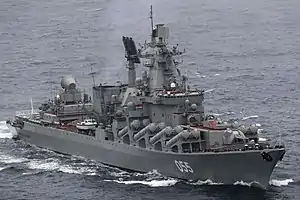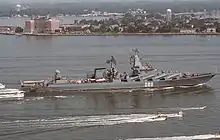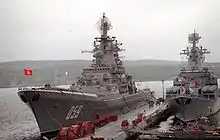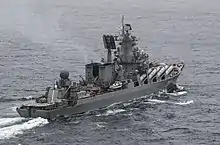Russian cruiser Marshal Ustinov
The Russian cruiser Marshal Ustinov (Russian: Маршал Устинов), is a Slava-class cruiser (Project 1164) of the Russian Navy. The Russian name for the ship type is Gvardeysky Raketnyy Kreyser (GRKR), meaning "Guards Missile Cruiser". The ship is named after Dmitriy Ustinov, a former Soviet Minister of Defence. Marshal Ustinov was assigned to the 43rd Missile Ship Division of the Russian Northern Fleet, whose homeport is in Severomorsk. From 2012 to 2016, the cruiser underwent a major overhaul. The vessel returned to service in 2017 and has since been deployed to the Mediterranean Sea.
 Marshal Ustinov in 2018, after modernisation | |
| History | |
|---|---|
| Name: | Marshal Ustinov |
| Namesake: | Dmitriy Ustinov |
| Builder: | 61 Kommuna #445 Yard, Nikolayev, USSR |
| Laid down: | 5 October 1978 |
| Launched: | 25 February 1982 |
| Commissioned: | 19 September 1986 |
| Homeport: | Severomorsk |
| Status: | in active service |
| General characteristics as built | |
| Class and type: | Guided missile cruiser |
| Displacement: | |
| Length: | 186.4 m (611 ft 7 in) |
| Beam: | 20.8 m (68 ft 3 in) |
| Draught: | 8.4 m (27 ft 7 in) |
| Propulsion: |
|
| Speed: | 34 knots (63 km/h; 39 mph) |
| Range: | 9,000 nmi (17,000 km; 10,000 mi) at 15 knots (28 km/h; 17 mph) |
| Complement: | 505 |
| Sensors and processing systems: |
|
| Electronic warfare & decoys: |
|
| Armament: |
|
| Aircraft carried: | 1 Kamov Ka-25 or Kamov Ka-27 helicopter |
| Aviation facilities: | Flight deck and hangar |
Description

Marshal Ustinov is a Slava-class cruiser designed during the Soviet Union as a Raketnyy Kreyser[1] or "anti-ship rocket cruiser (RKR)."[2] As originally constructed the vessel had a standard displacement of 10,000 tonnes (10,000 long tons) and 12,700 t (12,500 long tons) at full load.[2] By 2009, this had decreased to 9,530 t (9,380 long tons) standard and 11,670 tonnes (11,490 long tons) at full load.[3] The cruiser measures 186.4 metres (611 ft 7 in) long with a beam of 20.8 m (68 ft 3 in) and a draught of 8.4 m (27 ft 7 in). The vessel is powered by a combined gas or gas (COGOG) system comprising four 23,300 kilowatts (31,250 shp) boost gas turbines and two 8,900 kW (12,000 shp) cruise gas turbines driving two shafts for a combined 93,000 kW (125,000 shp). This gives the cruiser a maximum speed of 34 knots (63 km/h; 39 mph) and a range of 9,000 nautical miles (17,000 km; 10,000 mi) at 15 knots (28 km/h; 17 mph). As built the cruiser had a complement of 505.[2] This was later reduced to 476 including 62 officers.[3]
Marshal Ustinov when constructed was armed with sixteen P-500 Bazalt (SS-N-12 Sandbox) anti-ship missiles (SSM) in two eight-missile launchers located amidships to either side of the superstructure. They are also equipped with 64 S-300F Fort (SA-N-6 Grumble) long-range surface-to-air missiles (SAM) in eight eight-missile launchers located aft of the funnel and four OSA-M (SA-N-4 Gecko) SR SAMs in two twenty-round launchers located aft, to either side of the hangar. Marshal Ustinov is also armed with twin-mounted AK-130 130 mm (5 in)/L70 dual purpose guns located forward and six AK-630 30 mm (1.2 in) close-in weapons systems with two located forward atop the superstructure and four located amidships to either side of the superstructure. For anti-submarine warfare (ASW), the cruiser mounts two RBU-6000 anti-submarine mortars, each with six barrels and ten 533 mm (21 in) torpedo tubes two quintuple launchers behind shutters near the stern.[2][3]
The ship was equipped with MR-800 Voshkod/Top Pair 3-D long range air search and MR-700 Fregat/Top Steer air/surface search radar. For ASW, the cruisers is equipped with MG-332 Tigan-2T/Bull Nose hull-mounted LF and Platina/Horse Tail MF VDS sonar. Marshal Ustinov mounts MR-184/Kite Screech fire control radar for the 130 mm guns, 3R41 Volna/Top Dome radar for SA-N-6 SAM control, MPZ-301 Baza/Pop Group radar for SA-N-4 SAM control and Argument/Front Door-C radar for SSM control and 3 Bass Tilt radars for the AK-630s. The cruiser also utilises the Punch Bowl satellite link for its weapon targeting systems. For electronic warfare, the ship is supplied with the Kol'cho suite with Gurzhor-A&B/Side Globe intercept and MR-404/Rum Tub jammers.[2][3] The vessel mounts two PK2 chaff launchers.[3] The single Top Dome radar only has a 180° arc and presents a blind spot forward for the SA-N-6 missiles.[2]
The cruiser has a flight deck over the stern and a hangar. The cruiser can utilise either one Kamov Ka-25 or Kamov Ka-27 helicopter.[2][3] The hangar is one-half deck below the flight deck and is reached via an inclined ramp. The helicopter is maneuvered using a chain-haul system.[4] The helicopter can provide over-the-horizon targeting for Marshal Ustinov's weapon systems.[3]
Construction and career


Hull number 070 was laid down at the 61 Kommuna #445 Yard, Nikolayev (Mykolaiv) on 5 October 1978 as the second Slava-class ship initially named Admiral Lobov.[2] The cruiser was launched on 25 February 1982 and commissioned in the Soviet Red Banner Northern Fleet as the renamed Marshal Ustinov on 15 September 1986. Beginning in March 1987, the cruiser began operations with the fleet.[3] Marshal Ustinov has been known to carry two other hull numbers than her original (070); 088 and 055.[5] From December 1987 to June 1988, she performed the tasks of military service in the Mediterranean Sea.
In 1989 Marshal Ustinov was deployed to the Mediterranean Sea again. Between 22−26 July 1989 the cruiser, along with the oiler Genrik Gasanov and the destroyer Otilchny, paid an official visit to the naval base of Norfolk, Virginia, United States. This marked only the second time Soviet warships had made a visit to the United States since World War II.[6][7] On 4 January 1991 Marshal Ustinov started a patrol duty in the Mediterranean Sea. Between 16−20 July 1991 the cruiser paid a visit to the naval base of Mayport, Florida, United States. Marshal Ustinov was accompanied by the oiler Dnestr and the destroyer Simferopol. This marked the third time Soviet warships had visited the United States since the end of the Cold War.[8] Between 30 June–5 July 1993 she paid a visit to Halifax, Nova Scotia, Canada alongside the destroyer Admiral Kharlamov.[9]
In 1994, then commissioned in the Russian Northern Fleet, Marshal Ustinov was laid up at the Severnaya Verf shipyard in St. Petersburg awaiting extensive repairs. The refit was completed in May 1995.[3] In December 1996, the People's Republic of China purchased two Sovremenny-class destroyers and the income from this sale made it possible to pay for the $US169 million repairs to Marshal Ustinov. Marshal Ustinov remained in St. Petersburg until 1998 when the cruiser returned to the Northern Fleet.[3]
From 21 September to 22 October 2004 Marshal Ustinov took part in a long voyage of the carrier strike group of the Northern Fleet to the north-eastern part of the Atlantic.[10] Beginning on 17 July 2008 the cruiser patrolled the waters of the Arctic Ocean around Spitsbergen, replacing the destroyer Severomorsk.[11]
In March 2011 it was reported that Marshal Ustinov could be transferred to the Russian Pacific Fleet.[12][13] In 2011, it was decided to give the cruiser a moderate overhaul. However, in 2012, the navy decided to completely rework the cruiser.[14] In 2012 the cruiser was laid up for repairs and upgrades at the Zvyozdochka Shipyard. The refit comprised repairs to ship's hull structures, propeller-steering group mechanisms, main power plant, and general systems. The electronic weapons systems were upgraded with digital devices.[15] It was during this refit that the P-500 Bazalt missiles were upgraded to the modernized P-1000 Vulkan missiles.[14] The ship rejoined the navy in 2016,[16] and returned to active service in April 2017.[14]
On 12 May 2017, Marshal Ustinov, with cruise missiles on board, went on exercises in the Barents Sea.[17] On 4 July 2017, together with the destroyer Vice-Admiral Kulakov, Marshal Ustinov sailed from Severomorsk to the Baltic Sea and on 29 July she took part in the Main Naval Parade in St. Petersburg in honor of the Navy Day.[18][19] On 5 December 2017, the cruiser completed combat training missions in training ranges in the Barents Sea to repulse conventional air attacks of Sukhoi Su-33 fighters.[20]
On 3 July 2019, Marshal Ustinov left Severomorsk to participate in the Main Naval Parade in St. Petersburg before joining the Russian Navy exercise "Ocean Shield-2019" in the Baltic and on 22 August, entered the waters of the Mediterranean Sea. There, she visited ports in Algeria, Egypt, Turkey, Greece and Cyprus. Marshal Ustinov afterwards transited Gibraltar again and sailed into the Atlantic.[21][22] On its way to South Africa, the cruiser paid a port visit to Equatorial Guinea.[23] This was only a third time after the Cold War that a Russian cruiser entered the South Atlantic, the first two being Pyotr Veliky in 2008/2009 and Moskva in 2015.[24] Between 25 and 30 November Marshal Ustinov participated in joint naval drills with South Africa and China.[25] After the drills she transited Gibraltar.[22] On 6 January 2020 it was reported that the cruiser will be deployed off Syria due to the danger of an Iran-US war in order to provide protection for the Russian troops in Syria and to ensure stability in the region.[26]
Citations
- Couhat 1986, p. 514.
- Gardiner, Chumbley & Budzbon 1995, p. 385.
- Saunders 2009, p. 666.
- Couhat 1986, pp. 514–515.
- "Refitted Slava class guided missile cruiser Marshal Ustinov to rejoin Russian Fleet in 2015". navyrecognition.com. 16 December 2013. Retrieved 6 October 2014.
- Plunkett, A. J. (26 July 1989). "Soviet Sailors Say "Do Svidanya" After Successful Port Call". Daily Press. Retrieved 8 January 2020.
- "Soviet Warships in Port for a Taste of U.S. Hospitality". L.A. Times. 22 July 1989. Retrieved 8 January 2020.
- Glisch, John J. (13 July 1991). "Soviet Warships Stage Peaceful Invasion". Orlando Sentinel. Retrieved 8 January 2020.
- "Russia". Ships Monthly. Vol. 28. 1993. p. 31 – via Google Books.
- Institute, United States Naval (2005). "World Naval Developments". Proceedings of the United States Naval Institute. 131: 37 – via Google Books.
- "Российские военные корабли возобновили патрулирование в Арктике" [Russian warships resume patrolling in the Arctic]. Interfax (in Russian). 14 July 2008. Retrieved 8 January 2020.
- "Missile cruiser Marshal Ustinov moves to Pacific Fleet". rusnavy.com. 24 March 2011. Retrieved 6 October 2014.
- "Missile cruiser Marshal Ustinov may reinforce Russian Pacific Fleet in 2013 -Navy". en.ria.ru. 27 March 2011. Archived from the original on 9 October 2014. Retrieved 6 October 2014.
- "Ракетный крейсер "Маршал Устинов" вернули в строй после 6-летнего ремонта" [Missile cruiser Marshal Ustinov returned to service after 6 years of repair]. rbc.ru (in Russian). 21 April 2017. Retrieved 8 January 2020.
- ""Звездочка" завершила заводской ремонт ракетного крейсера "Маршал Устинов"" [Zvezdochka completes overhaul of missile cruiser Marshal Ustinov]. TASS (in Russian). 26 December 2016. Retrieved 8 January 2020.
- "Upgraded Slava-class Cruiser Marshal Ustinov Returns to Northern Fleet's Base". navyrecognition.com. 30 December 2016. Retrieved 21 December 2017.
- "Отремонтированный крейсер "Маршал Устинов" отправился в Баренцево море" [The repaired cruiser Marshal Ustinov set off for the Barents Sea]. flot.com (in Russian). 12 May 2017. Retrieved 8 January 2020.
- "Крейсер "Маршал Устинов" и БПК "Вице-адмирал Кулаков" взяли курс на Петербург" [The cruiser "Marshal Ustinov" and the BPC "Vice Admiral Kulakov" headed for St. Petersburg]. flot.com (in Russian). 4 July 2017. Retrieved 8 January 2020.
- "Главный парад ВМФ в Петербурге: гордость над вольной Невой" [The main parade of the Navy in St. Petersburg: pride over the free Neva]. RIA Novosti (in Russian). 30 July 2017. Retrieved 8 January 2020.
- "Крейсер "Маршал Устинов" отбил атаку истребителей Су-33" [The cruiser Marshal Ustinov repulsed the attack of Su-33 fighters]. flot.com (in Russian). 5 December 2017. Retrieved 8 January 2020.
- Nilsen, Thomas (3 August 2019). "Russian navy group, nuclear sub, sail north along coast of Norway". The Barents Observer. Retrieved 8 January 2020.
- "Russian naval ship enters Mediterranean waters". AMN. 18 December 2019. Retrieved 8 January 2020.
- "Russian missile cruiser wraps up visit to Equatorial Guinea". TASS. 11 November 2019. Retrieved 8 January 2020.
- "Russian Navy's Vessels Sail to Luanda, Angola". navaltoday.com. 10 July 2015. Retrieved 8 January 2020.
- "Drills involving Russian, Chinese and South African ships kick off in Cape Town". TASS. 25 November 2019. Retrieved 8 January 2020.
- "Крейсер "Маршал Устинов" внепланово перебрасывается к берегам Сирии" [An unplanned deployment for the cruiser "Marshal Ustinov" off the coast of Syria]. actualnews.org (in Russian). 6 January 2020. Retrieved 8 January 2020.
References
- Couhat, Jean Labayle, ed. (1986). Combat Fleets of the World 1986/87. Annapolis, Maryland: Naval Institute Press. ISBN 0-85368-860-5.CS1 maint: ref=harv (link)
- Gardiner, Robert; Chumbley, Stephen & Budzbon, Przemysław, eds. (1995). Conway's All the World's Fighting Ships 1947–1995. Annapolis, Maryland: Naval Institute Press. ISBN 1-55750-132-7.CS1 maint: ref=harv (link)
- Saunders, Stephen, ed. (2009). Jane's Fighting Ships 2009–2010 (112 ed.). Alexandria, Virginia: Jane's Information Group Inc. ISBN 978-0-7106-2888-6.CS1 maint: ref=harv (link)